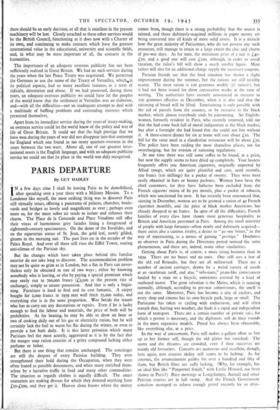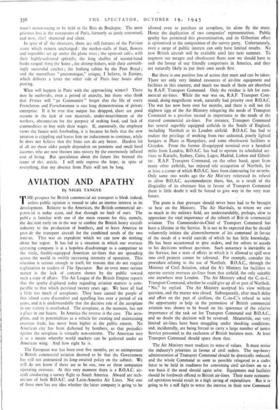PARIS DEPARTURE
By GUY HADLEY
IN a few days time I shall be leaving Paris to be demobilised, after spending over a year there with a Military Mission. To a Londoner like myself, the most striking thing was to discover Paris still virtually intact, offering a panorama of palaces, churches, boule- vards and bridges as lovely and magnificent as ever ; perhaps even more so, for the more sober air tends to isolate and enhance their charm. The Place de la Concorde and Place Vendome still offer their vistas of harmonious grey facades lining a foreground of eighteenth-century spaciousness. On the dome of the Invalides, and on the equestrian statue of St. Joan, the gold leaf, newly gilded, gleams in the morning sun. The past lives on in the arcades of the Palais Royal. And over all there still rises the Eiffel Tower, soaring anti-climax of the Parisian sky.
But the changes which have taken place behind this familiar exterior do not take long to discover. The accommodation problem may not be quite so grim as in London, but a flat in Paris can never- thekss only be obtained in one of two ways ; either by knowing somebody who is leaving, or else by paying a special premium which may easily run to 700,000 francs (£3,5oo at the present rate of exchange), simply to secure possession. And that is only a begin- ning. Furniture is hard to find and its cost fantastic. A carpet bought for 2,000 francs in 1939 may well fetch 25,000 today, and everything else is in the same proportion. Woe betide the tenant who has to carry out any decorations or repairs. Even if he is lucky enough to find the labour and materials, the price of both will be prohibitive. As for heating, he may be able to, draw an hour or two of cooking daily out of his gas or electricity ration, but he will certainly lack the fuel to warm his flat during the winter, or even to provide a hot bath daily. It is this latter privation which many Parisians feel the most acutely, aggravated as it is by the fact that the meagre soap ration consists of a gritty compound lacking either perfume or lather..
But there is one thing that remains unchanged. The concierges are still the despots of every Parisian building. They even strengthened their hold during the Occupation, when they were often feared as possible denouncers, and when many enriched them- selves by a lucrative traffic in food and many other commodities. The situation as regards clothes is equally difficult. The smart couturiers are making dresses for which they demand anything from £50-£200, and they get it. Heaven alone knows where the money comes from, though there is a strong probability that the source is tainted, and those dubiously-acquired millions in paper money_ are being converted into all kinds of more solid assets. It is a miracle how the great majority of Parisiennes, who do not possess any such resources, still manage to retain to a large extent the chic and charm of pre-war days.. As for men, the minimum price of a suit is L40- L50, and a good one will cost Ltoo, although, in order to avoid taxation, the tailor's bill will show a much smaller figure. Most tailors will also for an additional charge supply the necessary coupons.
Parisian friends say that the food situation has shown a slight improvement during the summer, but the rations are still terribly scanty. The meat ration is too grammes weekly (3) ounces), but it had not been issued for three consecutive weeks at the time of writing. The authorities have recently announced an increase to 250 grammes effective in December, when it is also said that the rationing of bread will be lifted. Entertaining is only possible with the aid of parcels from the country, or by recourse to the black market, which almost everybody ends by patronising. An English- woman, formerly resident in Paris, who recently returned, told me that she had come back full of moral indignation at the black market, but after a fortnight she had found that she could not live without it. A three-course dinner for six at home will cost about Do. The bill for the same meal in a clandestine restaurant will be about Lso. The police have been raiding the most shameless places, not for overcharging, but for evasion of rationing regulations.
At one time there was still some coffee to be found, at a price, but now the supply seems to have dried up completely. Your hostess frequently offers you American cigarettes, originally imported by Allied troops, which are quite plentiful and cost, until recently, Too francs (ten shillings) for a packet of twenty. They were most easily obtained in bars or beauty parlours. Women have been the chief customers, for they have hitherto been excluded from the French cigarette ration of 8o per month, plus a packet of tobacco, which was sanctioned for men. It has recently been announced that, starting in December, women are to be granted a ration of 40 French cigarettes monthly, and the price of black market Americans has already dropped to go francs. In spite,of all the difficulties, French families of every class have shown most generous hospitality to British and American personnel in Paris. Among the small minority of people with large fortunes—often newly and dubiously acquired— there exists also a curious rivalry, a desire to "go one better," in the way of entertaining, as a means of gaining "prestige." Doubtless an observer in Paris during the Directoire period noticed the same phenomenon, and there are, indeed, many other similarities.
Getting about Paris is, of course, a more tiring business than in 1939. There are no buses and no taxis. One still sees a few of the old red Renaults, but they are all militarised. There are a number of ancient carriages, drawn by a weird variety of steeds at an exorbitant tariff, and also " velo-taxis," pram-like conveyances hauled by a man on a bicycle, sometimes assisted by a kind of outboard motor. The great salvation is the Metro, which is running normally, although, according to pre-war connoisseurs, the smell is not the same. Moreover, Paris has become a city of cyclists, and every shop and cinema has its own bicycle park, large or small. The Parisienne has taken to cycling with enthusiasm, and will often remark that, barring wet weather, she finds it a rapid and independent form of transport. Therc are a certain number of private cars, for which a permit is necessary, and the diplomats still do their rounds in the most expensive models. Petrol has always been obtainable, like everything else, at a price.
In the way of amusement, Paris still makes a gallant effort to live up to her former self, though the old glitter has vanished. The opera and the theatres are crowded, even if their successes are mainly old favourites. Concerts are numerous and excellent, though, here again, new creative ability still seems to be lacking. As for cinemas, the entertainment guides list over a hundred and fifty of them, but British films are sadly lacking. (Why, for example, has an ideal film like "Pimpernel Smith," with Leslie Howard, not been shown in Paris?) Race meetings at Longchamps, Auteuil and other Parisian courses are in full swing. And the French Government somehow managed to release enough petrol recently for an after- noon's motor-racing to be held in the Bois de Boulogne. The most grievous loss is the restaurants of Paris, formerly so justly renowned, and now, alas! shuttered and silent.
In spite of all the shortages, there are still features of the Parisian scene which remain unchanged : the market-stalls of fruit, flowers and vegetables set up under the plane trees ; the open-air cafés, with their highly-coloured aperitifs; the long shelfes of second-hand books ranged along the Seine ; the shrimp-fishers, with their astonish- ingly successful catches ; the bathing cabins by the Pont Royal ; and the marvellous " pneumatique," unique, I believe, in Europe, which delivers a letter the other side of Paris four hours after posting.
What will happen in Paris with the approaching winter? There may be outbreaks, even a period of anarchy, but those who think that France will "go Communist" forget that the life of every Frenchman and Frenchwoman is one long demonstration of private enterprise. If it be true that output has dropped, there are good reasons in the lack of raw materials, under-nourishment of the workers, absenteeism for the purpose of seeking food, and lack of commodities to buy with their wages. If, conversely, the employer views the future with foreboding, it is because he feels that the new taxation is crippling and leaves him no inducement to continue, while he does not believe that the State can do any better. Hardest hit of all are those older people dependent on pensions and small fixed incomes who are now thrown into misery by the enormously inflated cost of living. But speculation about the future lies beyond the scope of this article. I will only express the hope, in spite of everything, that my absence from Paris will not be long.



























 Previous page
Previous page